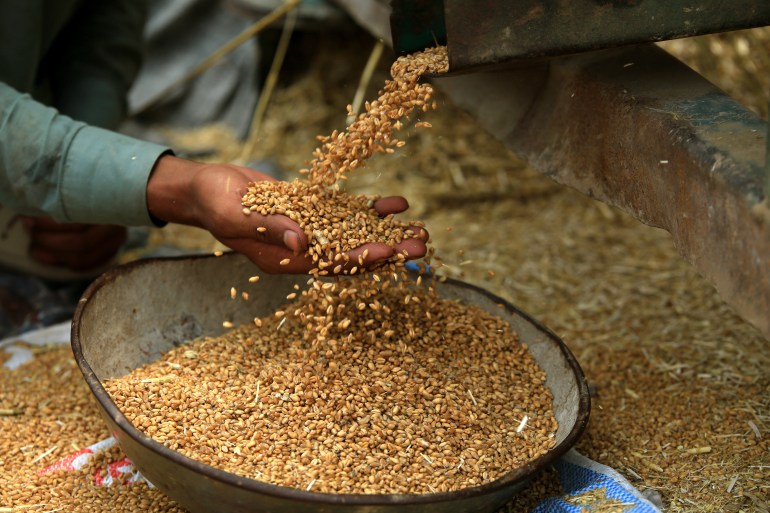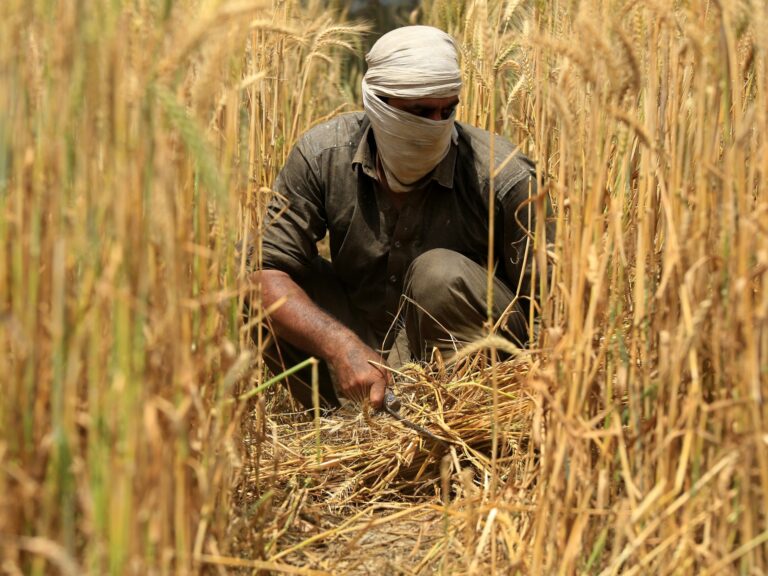Islamabad, Pakistan – In Pakistan, tens of thousands of farmers are demonstrating in several cities against the government’s decision not to buy their wheat, which is causing them enormous loss of income.
Farmers in Punjab, the country’s largest province and often called Pakistan’s “breadbasket”, are demanding that the government end wheat imports that have flooded the market at a time when they expect bumper harvests.
On Monday, during a demonstration in Lahore, the provincial capital, police violently pushed back farmers with batons and arrested dozens.
Here’s what we know so far about the problem:
What sparked the protests?
Farmers are furious over the importation of wheat in the second half of last year and the first three months of this year, which led to an excess of wheat in the market and a drop in prices.
Agriculture is one of the largest revenue sectors in Pakistan, accounting for almost 23 percent of the country’s gross domestic product (GDP). Wheat represents 2 percent of the total.
Devastating aftermath floods in Pakistan in 2022, the impact on wheat cultivation caused a wheat shortage in early 2023. While Pakistan consumes around 30 million tonnes of wheat per year, only 26.2 million tonnes were produced in 2022, which drove up prices and led to long queues. in the towns trying to buy wheat. There have even been cases where people have been crushed by crowds trying to access the wheat.

The Pakistan Democratic Movement (PDM), the ruling coalition at the time, decided to allow the private sector to import wheat in July 2023, just one month before the end of its term in government.
According to figures from the Ministry of National Food Security and Research, between September 2023 and March 2024, more than 3.5 million tonnes of wheat were imported into Pakistan from the international market, where prices were much lower.
Due to this surplus, at the beginning of April this year, when Pakistani farmers began harvesting their wheat, the national and provincial food storage departments held over 4.3 million tonnes of wheat in their stocks.
Usually, the government purchases around 20 percent of all wheat produced by local farmers at a fixed price (around 5.6 million tonnes, based on a yield of 28 million tonnes in 2023). This market intervention, he claims, ensures price stability, prevents hoarding and maintains the supply chain. This year, however, it announced that it would purchase only 2 million tonnes of wheat from Pakistani farmers.
If farmers produce as much wheat this year as last year – and in fact, they expect to produce more – that would only represent about 7 percent of total production, leaving farmers destitute, they say. they.
Khalid Mehmood Khokhar, president of the Pakistan Kissan Ittehad (PKI) farmers’ organization and a farmer in Punjab’s Multan city, said that also allowing private importers to import wheat at will into the country last year means that farmers will now have to sell what they can to other sources at deeply discounted prices – and they will suffer heavy losses.
“With a bumper harvest, we are expected to produce nearly 32 million tonnes of wheat this year, but with government coffers already full of wheat, we will only be able to sell 50 percent of our harvest. This could result in losses of almost 380 billion rupees ($1.4 billion),” Khokhar told Al Jazeera.
Why is the amount of wheat purchased by the government important?
According to Adil Mansoor, a Karachi-based food security analyst and researcher, the government’s annual purchase of domestic wheat helps set the price at which farmers’ remaining wheat is sold to millers and other market players.
“When everyone knows that the largest buyer (the government) will buy wheat at a certain price, this means that the rest of the market operates accordingly since the government has set a reference price and sells goods at that price” , did he declare. explain.
What are the farmers saying?
Ishfaq Jatt, a wheat and cotton farmer who owns 4.8 hectares (12 acres) of land in Khanewal, Punjab, said the cost of producing wheat has increased sharply due to the high price of fertilizers, water and other needs related to wheat cultivation.
“Now we farmers also have to sell the wheat to middlemen at a very discounted price, causing us losses,” Jatt told Al Jazeera. “I have a small farm. I don’t have space to store the wheat I grew. What am I going to do with it? And if I don’t earn income from my crop, how can I sow my next crops?
He added that many farmers may choose to avoid planting wheat in future years if they feel they “can no longer trust the government.”
What does the government say?
Prime Minister Shehbaz Sharif has ordered an investigation into the wheat crisis.
Bilal Yasin, Punjab’s provincial food minister, told the provincial assembly earlier this week that the crisis was caused by decisions taken by the caretaker government that took power in August last year, after the end of the mandate of the previous elected government. The elections, which should have taken place within three months, were delayed due to the need to redraw constituencies following the last census. They finally took place in February this year.
“Those who allowed the importation of wheat ahead of the wheat harvest season are responsible for this crisis. However, despite this, the government will fully support small farmers,” the minister said.
Al Jazeera contacted the food minister for further comment but did not receive a response.
How will consumers be affected?
Mansoor said the government’s decision not to buy surplus wheat this year “reeks of poor planning and management”, but he stressed that ultimately it will benefit consumers who have been hit hard by the cost of living crisis, because the price of wheat will fall.
“Farmers will naturally be very unhappy, and some will suffer massive losses. But if consumers benefit, is it a bad situation? » asked Mansoor.
Pakistan has been hit by a price spike over the past two years. At its highest level, inflation stood at almost 38% in May 2023.
However, government measures to combat inflation – along with loans from the International Monetary Fund (IMF) – have brought relative stability, with inflation falling to 17 percent in April, its lowest level in more than two years. years.
Mansoor also welcomed the government’s effective withdrawal from any interference in the market.
“The government should have communicated better to farmers about their intention not to buy wheat from them. But in the long run it is a good thing for the government to get out of the market,” he said. “This cannot happen overnight, but gradually its involvement should be gradually withdrawn in the coming years. »


